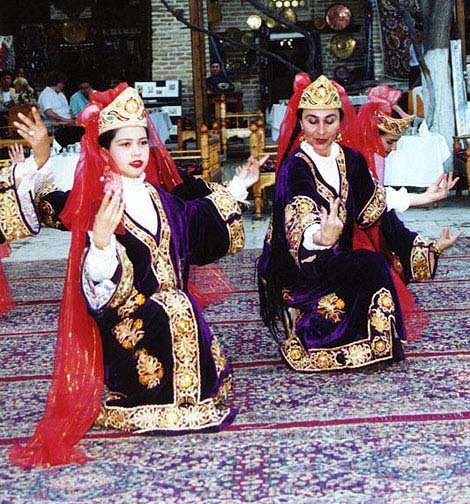
Peace Corps Volunteer JP Banks evacuated from Uzbekistan after 911
ACTS OF TERROR ENDED MISSION OF PEACE ; PEACE CORPS VOLUNTEER FROM PETALUMA PULLED FROM UZBEKISTAN
Mar 8, 2002 - Press Democrat
Shelley Klaner For The Press Democrat
For JP Banks, the Sept. 11 attacks on America was more than a tragedy for his country. It abruptly ended his work as a Peace Corps volunteer in Uzbekistan, the Central Asian nation north of Afghanistan.
Banks, a former Petaluma resident, was one of 150 Peace Corps members evacuated from Uzbekistan 16 days after hijacked jetliners crashed into the World Trade Center and the Pentagon.
Banks, 49, was overwhelmed as he watched the New York skyscrapers collapse on CNN -- carried on Moscow TV -- in Uzbekistan, an impoverished Muslim nation slightly larger than California.
His Peace Corps mission, including formation of a new youth group, came to an abrupt end, and about a month later he was back in the North Bay, working at a Ukiah-based health services agency.
"It was like having a big chunk of my heart taken out," Banks said of his forced departure. "It was a big disappointment and a big letdown."
Initially, Banks tried to land a job with another aid organization and return to Uzbekistan, a nation of 25 million people exactly halfway around the world from the Bay Area. The Peace Corps was the only U.S. organization pulled from Uzbekistan, and Banks said 10 of those volunteers have returned with other agencies.
But now he feels his childhood goal has been met and has no plans to return, except for a social visit.
"I fulfilled my dream," said Banks, who had wanted to join the Peace Corps since its inception by President John F. Kennedy when Banks was only 9 years old.
Banks was one of the two oldest volunteers in Uzbekistan, and sensed the end of his mission when President Bush, in his Sept. 20 speech to Congress, linked Osama bin Laden's al-Qaida organization to other terrorist groups, including the Islamic Movement of Uzbekistan.
The next day, parents of Peace Corps volunteers in Afghanistan, most in their 20s, began calling the agency and demanding their children be brought home.
The Afghan-based Islamic Movement had raised tensions in the region, but the summer had been relatively quiet, Banks said.
In the middle of teaching a seminar, Banks was told to take a taxi back to Tashkent and then to leave, with just one suitcase, on Sept. 27. He quickly gave away nearly all of the possessions he had acquired.
"We didn't feel threatened at all," Banks said, but he was soon in Washington, D.C., filling out reams of paperwork and going through psychological counseling.
At least 150 Peace Corps volunteers were pulled out of Uzbekistan, along with volunteers in neighboring Tajikistan and Turkmenistan.
There were no Peace Corps members in Afghanistan, but the Bush administration may send some there as part of an agency expansion, Banks said.
He joined the Peace Corps in March 2000 and took a three-month training program, including classes in Russian, health and safety, administration and cross-cultural issues.
The initial training was in Chirchik, Uzbekistan, where he lived with a Russian family. He then lived with a Korean family before he moved to the capital city of Tashkent, where he rented a roach- infested apartment.
The Peace Corps paid him a "living wage" equivalent to $50 a month, more than many Uzbek families earned, he said.
Banks was sworn in as a volunteer in May 2000 and named chief administrator of the Project for Economic Reform and Development in Central Asia, responsible for developing Uzbek medical assistance programs.
In the U.S., Banks had worked with the Petaluma Health Care District and as director of business development at Ross Hospital in Kentfield. A 10-year Petaluma resident, he also was coordinator of outreach services for Petaluma People Services Center.
For 16 months in Uzbekistan, Banks managed a medical supply distribution program, delivering more than $3 million worth of supplies.
He was also coordinator of the Uzbekistan HIV/AIDS Adolescent Peer Education project and developed curriculum and designed a brochure in English, Russian and Uzbek.
The evacuation ended his work with the Youth Empowerment Society of Uzbekistan, seeking grants for a youth resource center and an after-school program for elementary school children.
Banks now works for Community Health Services of Mendocino County, a private, nonprofit umbrella organization for six rural health clinics.
In Central Asia, he said he found that people are the same everywhere, despite cultural differences. One of those differences, however, is drinking vodka, which Russian conquerors brought to Uzbekistan in the late 19th century.
Uzbekistan is now in its 11th year of independence from the former Soviet Union, and vodka remains the accepted beverage. But local brands are not as palatable as U.S. vodka, Banks said.
You can reach Correspondent Shelley Klaner at 775-3364 or klanerpr@aol.com
